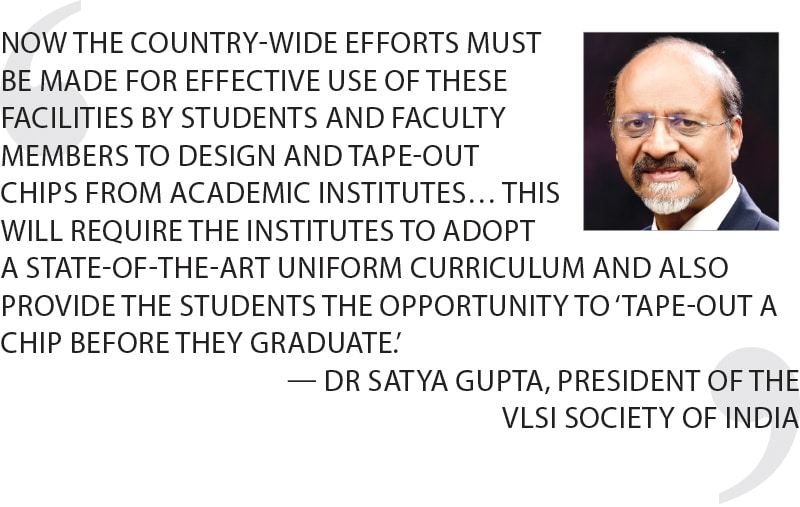Paused, not derailed—experts see the Adani and Zoho exits as distinct but strategic, not setbacks. Rather than failure, they signal a pivot: India’s chip drive now hinges
on design depth and delivering existing models.
On April 30, 2025, reports emerged that the Adani Group had paused discussions with Israel’s Tower Semiconductor regarding a much-anticipated $10 billion chip fabrication model in India. A day later, software major Zoho announced the suspension of its $700 million plan to enter chip manufacturing.
The Economic Times framed these exits as a “setback to Prime Minister Narendra Modi, who has for several years tried to lure companies in his pursuit to make India a global chip manufacturing hub.”
Yet the reasons diverged. Zoho founder Sridhar Vembu explained that, despite an extensive search, the company could not secure a suitable technology partner to navigate the complexities of chipmaking. Adani, on the other hand, cited uncertainty around domestic demand and doubts over the model’s viability.
The shelving of two high-profile, capital-intensive ventures raises critical questions. What do these exits mean for India’s semiconductor roadmap—particularly as the domestic market is projected to reach $64 billion by 2026, and Union Electronics and IT Minister Ashwini Vaishnaw maintains that ‘Made-in-India’ chips will debut by year-end? Do these developments point to structural gaps in India’s readiness for chip manufacturing? Are policy frameworks overly optimistic—or are such shifts part of a natural evolution shaped by global headwinds?
A timeline
On September 6, 2024, Adani Group partnered with Israel’s Tower Semiconductor to establish a $10 billion semiconductor fabrication plant in Taloja, near Mumbai, Maharashtra. Approved by the Maharashtra state government, the project was to be developed in two phases; the first with a production capacity of 40,000 semiconductor wafers per month, followed by expansion to 80,000 wafers per month in the second phase.
The venture applied for subsidies under the India Semiconductor Mission (ISM)’s incentive programme. However, the application remained under review by the central government, with no incentives granted. The plant was projected to generate nearly 5000 jobs.
By May 2025, reports emerged that discussions had been terminated, as internal evaluations cited uncertainty about domestic semiconductor demand and concerns regarding Tower’s financial commitment.
In March 2023, Chennai-based software-as-a-service (SaaS) firm Zoho announced plans to establish a semiconductor design model in Tenkasi, Tamil Nadu. This initiative aimed to harness local talent and boost India’s semiconductor design capabilities.
In June 2023, Zoho applied for a licence under the ISM to set up a compound semiconductor fabrication plant. The company earmarked an initial investment of $200 million, with projections suggesting the total investment could reach $600 million, contingent on a suitable technology partnership.
In December 2024, the Karnataka government approved Zoho’s proposal to establish a semiconductor manufacturing facility in the Mysuru region. Valued at ₹34.26 billion (approximately $400 million), the project was to be executed through Zoho’s subsidiary, Silectric Semiconductor Manufacturing. The facility was expected to create approximately 460 jobs and would have been the state’s first semiconductor unit.

However, in May 2025, the capital-intensive nature of semiconductor fabrication prompted Zoho to suspend the project. Sridhar Vembu noted, “We did not have that confidence in the tech, so our board decided to shelve this idea for the time being, until we find a better tech approach.”
These are not isolated cases. Previous big-budget semiconductor ventures have also faltered despite initial momentum. A notable example is the $19.5 billion joint venture between Vedanta and Foxconn to establish a semiconductor fab in Dholera, Gujarat, which was dissolved in July 2023.
That venture also applied under the ISM but did not advance far enough to receive formal approval or fund disbursement. It faced setbacks, notably the inability to secure a committed technology partner. Talks with European semiconductor firm STMicroelectronics collapsed after the Indian government insisted on deeper technical involvement rather than superficial collaboration.
Delays in incentive processing and escalating cost projections further complicated matters, culminating in Foxconn’s exit from the joint venture by mutual consent. Vedanta has since explored alternative partnerships to pursue its semiconductor goals.
And Dholera? It is now slated to host India’s first approved commercial semiconductor fabrication facility. In March 2024, Tata Electronics and Taiwan’s PSMC received approval for an ₹910 billion (~$11 billion) project focused on 28nm+ nodes for automotive, consumer, and industrial applications.
Why setting up a fab is not a cup of tea
Oops! This is an EFY++ article, which means it's our Premium Content. You need to be a Registered User of our website to read its complete content.
Good News: You can register to our website for FREE! CLICK HERE to register now.
Already a registered member? If YES, then simply login to you account below. (TIP: Use 'forgot password' feature and reset and save your new password in your browser, if you forgot the last one!)









